In this article:
Collaborating with family, friends, and physicians will give parents specific guidelines to help decide if their children’s expressions of symptoms are similar to what was experienced before.
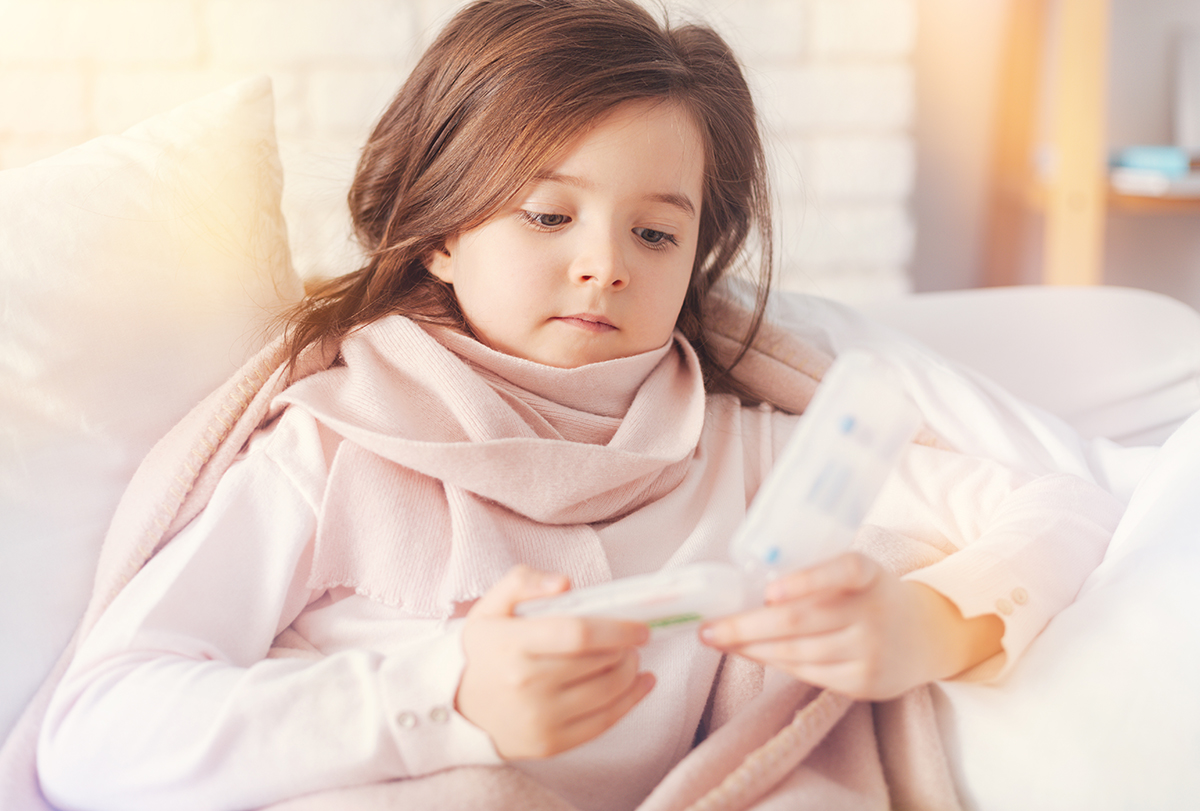
When babies do some strange jerking at times, it is reassuring to hear a grandparent express that a parent had the very same behaviors and developed just fine.
Pediatricians are well trained to monitor children’s symptoms for illnesses and other challenges to health. Therefore, schedule wellness visits in a timely fashion to pick up on the changing physical body and development of your children.
Common Signs That Your Child May Be Unwell
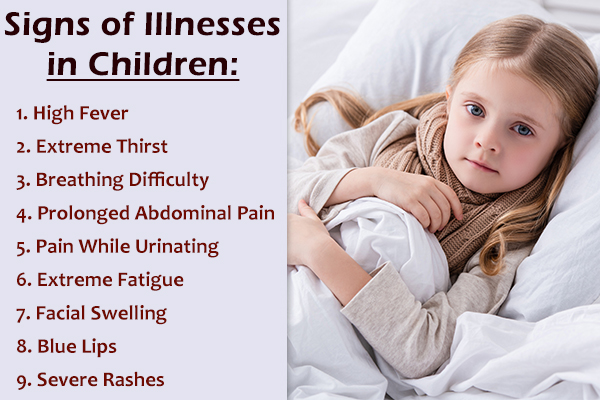
When the child stops participating in the usual activities that the family expects, it could be the result of illness. Other common symptoms to watch out for are:
1. High fever
This is a common manifestation of various health problems. The child may feel warm, flushed, sweaty, and thirsty when running a fever.
2. Extreme thirst
While children, especially toddlers, do drink water and frequently urinate, an abnormal increase in these activities may be indicative of diabetes. (1)
3. Breathing difficulty
Wheezing is a common problem with various causes, with asthma being a common reason. Rapid breathing can occur due to respiratory problems such as pneumonia and bronchiolitis. However, sudden difficulty in breathing could result from choking or blockage in the airway.
4. Prolonged abdominal pain
Abdominal pain is often accompanied by constipation. While it is rare in infants, it is a common symptom in older children. Other reasons for abdominal pain include urinary tract infections (UTIs), appendicitis, lead poisoning, milk allergies, and emotional upset.
5. Pain while urinating
A painful sensation during urination, accompanied by increased urinating frequency, is a symptom of a UTI, which is a highly common bacterial infection among children. (2)
6. Extreme fatigue
If your child experiences sudden muscle weakness, it is imperative to check with your doctor. True weakness can manifest due to problems in the spinal cord and nerves.
7. Facial swelling
Any allergic reaction, hives, skin infection, or formation of sebaceous cysts can result in facial swelling.
8. Blue lips
Medically known as cyanosis, a bluish-purple hue in the lips, earlobes, fingernails, or mouth results from a lack of oxygen in the bloodstream.
9. Severe rashes
The appearance of red or pink rashes over the skin could be from a viral infection, insect bite, roseola, drug rash, or petechiae rash.
10. Trouble focusing
Some kids are easily distracted and thus have trouble concentrating, following directions, remembering details, and finishing tasks.
11. Slow weight gain
This may occur due to any number of factors that prevent access to food or hinder its digestion. Thus, a slow weight gain may be due to metabolic disorders, financial hardships, or often a combination of various factors.
Physical Symptoms Can Be a Sign of Mental Distress
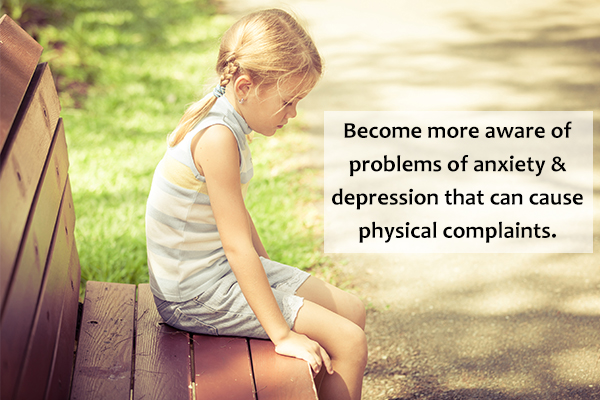
With an increased ability to focus on the overall wellness of children, we are becoming more aware of problems of anxiety and depression that can cause physical complaints.
When a child is not functioning properly in social settings, feelings such as isolation or loneliness may cause complaints of fatigue, abdominal pain, or headache, which can result in the child not participating in family activities.
It is helpful when parents evaluate these complaints by taking the child’s temperature and evaluating for signs of illness. Having a discussion with the child about when they noticed the symptoms and what was happening around them at that time may be useful. They may also consult a daycare provider or teacher if symptoms are present outside the home.
If the parent is still concerned, consulting a doctor can help discover the cause and become a way of empowering the child to discuss feelings and events that concern them.
Nocturnal Thirst Among Children
If the child awakens to drink multiple times at night, consistently night after night, this is something to consult with a physician. Children may ask for something to drink following a bad dream as a request for adult reassurance in addition to doing something simple such as drinking.
Is It Common for Children to Be Out of Breath When They Are Exercising or Playing?
If the exercise is new, prolonged, or in hot or difficult conditions, it can cause children to need a break. Usually, with repeated activity and the use of appropriate breaks, children are better able to develop endurance to sports. (3)
Why Do Children Hold in Their Stool and Urine?
Children are sometimes afraid of passing stool and urine, usually around potty training.
Children know this is an important task for parents and can become very upset if they feel they are not doing it properly. If this occurs outside potty training, consult with the child’s physician.
Are Facial Swelling and Rashes Always Symptoms of an Allergic Reaction in Children?
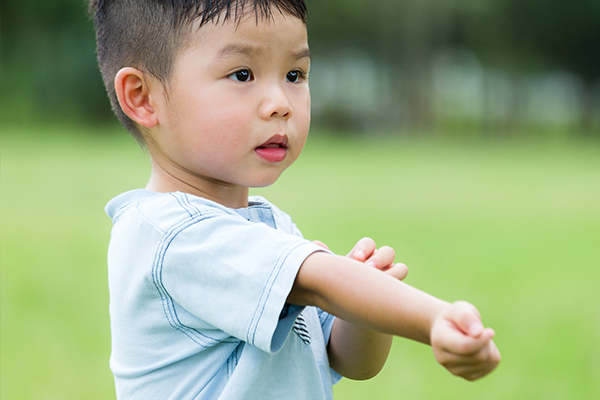
There are many different kinds of “allergic” reactions that humans express with different challenges. Most of them are not consistently harmful.
The easiest reactions to see are the swollen, red areas on children’s sweet and relatively unchallenged skin. The reactions are usually caused by the skin being irritated by something. (4)
The skin’s response is to call up a histamine reaction, which causes a discrete wheal (5) on the skin, and the surrounding area becomes bright red.
The irritant may be something the skin touched directly, something the child ate, or a viral infection where other symptoms were unnoticed. This reaction may not be the sign of an allergy at all, but the body’s reasonable response to something that bothered it.
Occasionally, if the reaction is long-lasting or really uncomfortable, an antihistamine will be recommended by the doctor.
How to Care for Children With ADHD?
Attention deficit hyperactivity disorder (ADHD) or attention deficit disorder (ADD) should be diagnosed and monitored by a professional with credentials, such as a physician, psychologist, or psychiatrist.
It is important that the child and family feel that the monitoring involves their concerns first and foremost since ADHD impacts a child’s life and that of the family in many ways.
There needs to be coordination of understanding the levels of functioning of the child in all environments in order to assure success personally, in school, and at home.
Abnormal Weight Gain in Children
According to the body weight set point theory, the weight of an individual is influenced by hormonal, genetic, and metabolic factors. (6) Therefore, slow weight gain or obesity can be monitored well through visits to the doctor.
Some disorders that can cause obesity are Prader-Willi syndrome (7) and hypothyroidism. (8) Psychological problems, such as anxiety and depression can also be the underlying cause of childhood obesity. (9)
Depression in Children
Depressive episodes can cause many different symptoms in children, such as irritability and isolation. (10)
Involved parents who regularly and routinely interact with their children through play, eating together, and having some time every day to check in with each other to see how things are going can detect a change in wellness in their children.
Treating Abdominal Pain in Children
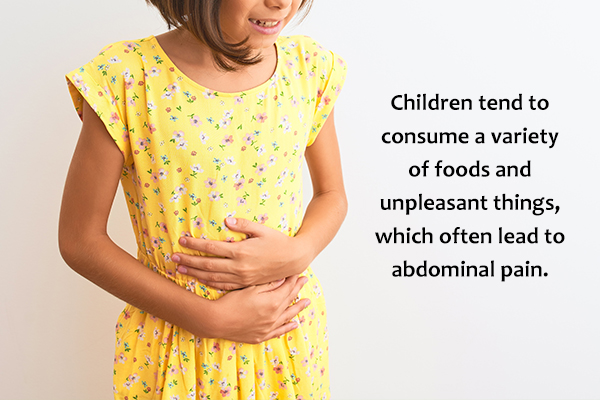
Children tend to consume a variety of foods and unpleasant things, which often lead to abdominal pain. Abdominal pain is one of the most difficult symptoms to sort out for both parents and physicians.
It is common for food choices to be way too broad and include many items that are not even food, such as overly processed foods. Focus on a diet rich in plain water, some dairy products, and healthy, whole foods for meals and snacks.
When the pain is to the point of causing diarrhea, vomiting, constipation, or awakening the child at night, a consultation with a doctor is helpful.
Extreme Fatigue in Children
Illnesses can be evaluated by the doctor. Other reasons can be depression or anxiety and should be just as compelling a reason to get help from a doctor.
Final Word
Play, talk, laugh, include your child in discussions and family activities such as chores, and discover and share common interests. Most importantly, listen actively to your child and provide the reassurance that you love them, will protect them, and enjoy being around them.
- Was this article helpful?
- YES, THANKS!NOT REALLY


